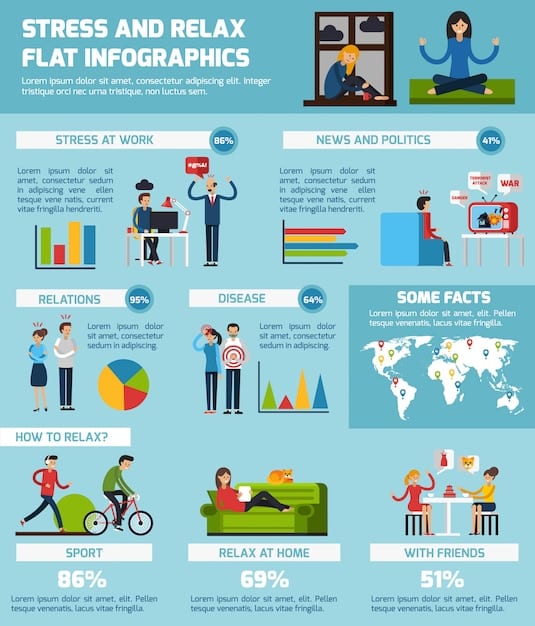The Truth About Stress Supplements: Do They Really Work?

The Truth About Stress Supplements: What Works and What’s a Waste of Money? explores the effectiveness of various stress relief supplements, separating evidence-based options from those with limited or no scientific backing, helping consumers make informed choices.
Feeling overwhelmed? You’re not alone. Many turn to supplements to manage stress, but **The Truth About Stress Supplements: What Works and What’s a Waste of Money?** is a complex topic. Are you spending your money wisely, or are you falling for clever marketing?
Understanding Stress and the Allure of Supplements
Stress is a common experience, but chronic stress can negatively impact your health. The supplement industry is booming with products promising stress relief, making it challenging to discern which ones are genuinely effective.
Many people seek quick fixes for stress, turning to supplements without fully understanding their ingredients or scientific backing. This section aims to provide clarity on the science of stress and how supplements fit into the picture.
The Physiology of Stress
When faced with a stressful situation, your body activates the “fight or flight” response. This involves the release of hormones like cortisol and adrenaline, which can lead to increased heart rate, blood pressure, and alertness. While this response is helpful in the short term, prolonged activation can have detrimental effects.
Why People Turn to Supplements
The appeal of stress supplements lies in their promise of a natural and convenient way to manage stress symptoms. Many perceive supplements as safer than prescription medications, and the ease of access contributes to their popularity.

However, it’s crucial to approach supplements with caution. Not all supplements are created equal, and some may interact with medications or have unwanted side effects.
- Convenience: Easy to incorporate into daily routines.
- Perceived Safety: Often seen as a natural alternative to medication.
- Accessibility: Available over-the-counter without a prescription.
Ultimately, understanding the underlying causes of stress and adopting healthy coping mechanisms is essential. Supplements can be a part of a holistic approach, but they should not be the sole solution.
In conclusion, stress is a complex issue with physiological and psychological components. Supplements can offer some relief, but it’s important to be informed about their potential benefits and risks.
Evidence-Based Supplements for Stress Relief
Not all stress supplements are created equal, and some have more scientific evidence supporting their efficacy than others. This section will delve into supplements that have some research backing their ability to reduce stress and anxiety.
While individual results may vary, these supplements have shown promise in clinical studies. It’s always best to consult with a healthcare professional before starting any new supplement regimen.
L-Theanine
L-Theanine is an amino acid found primarily in green tea. It’s known for its calming effects without causing drowsiness. Studies suggest that L-Theanine can promote relaxation and improve focus.
L-Theanine is believed to work by influencing neurotransmitters in the brain, such as GABA and dopamine. It may also help to reduce the physiological effects of stress, such as increased heart rate.
Ashwagandha
Ashwagandha is an adaptogenic herb that has been used in traditional Ayurvedic medicine for centuries. Adaptogens are substances that help the body adapt to stress and maintain balance. Research indicates that Ashwagandha can reduce cortisol levels and improve overall stress resilience.
- Cortisol Reduction: May help lower levels of the stress hormone cortisol.
- Anxiety Relief: Suggests potential benefits for reducing anxiety symptoms.
- Improved Sleep: Can contribute to better sleep quality in some individuals.

It’s important to note that Ashwagandha may not be suitable for everyone. Pregnant women and individuals with certain autoimmune conditions should avoid it.
In summary, L-Theanine and Ashwagandha are two supplements with some evidence supporting their use for stress relief. However, it’s crucial to consult with a healthcare professional to determine if they are right for you.
Supplements with Limited or No Scientific Backing
The supplement market is flooded with products claiming to relieve stress, but many lack solid scientific evidence. It’s essential to be aware of supplements that may not deliver on their promises.
This section will highlight supplements that have limited or no scientific backing for stress relief. While some anecdotal evidence may exist, it’s important to rely on credible research when making decisions about your health.
Kava
Kava is an herb traditionally used in the Pacific Islands for its relaxing effects. While some studies have shown it to be effective for anxiety, concerns about liver toxicity have limited its widespread use.
Valerian Root
Valerian root is often used as a sleep aid and for anxiety relief. However, the evidence supporting its effectiveness for stress is mixed. Some studies have shown benefits, while others have found no significant effect.
The inconsistent results of valerian root studies may be due to variations in the quality of the supplements used, as well as differences in study design.
- Inconsistent Results: The scientific evidence supporting its effectiveness for stress is mixed.
- Dosage and Quality Variations: Dosage and quality can vary significantly.
- Potential Side Effects: Can cause drowsiness.
In conclusion, Kava and Valerian root are examples of supplements with limited or conflicting evidence for stress relief. It’s essential to be cautious when considering these options and to discuss them with a healthcare professional.
The Importance of Dosage and Quality
When considering stress supplements, dosage and quality are crucial factors. Even supplements with proven benefits may be ineffective if taken in incorrect dosages or if they are of poor quality.
Supplement manufacturers are not always subject to the same rigorous regulations as pharmaceutical companies. This can lead to variations in product quality and potency.
Dosage Guidelines
It’s important to follow recommended dosage guidelines when taking supplements. Taking too much of a supplement can lead to adverse side effects.
It’s always best to start with a low dose and gradually increase it as needed, while monitoring for any negative reactions.
Third-Party Testing
To ensure quality, look for supplements that have been third-party tested. Third-party testing organizations, provide independent verification of product quality and purity.
These organizations test supplements for contaminants, such as heavy metals and pesticides. They also verify that the supplement contains the ingredients listed on the label in the correct amounts.
- Look for Certification Seals: Organizations like USP, NSF International, and ConsumerLab.com.
- Read Labels Carefully: Check ingredient lists and dosage information.
- Consult Healthcare Professional: Obtain personalized recommendations on dosage and quality.
Ultimately, choosing supplements from reputable brands and ensuring proper dosage and quality can increase the likelihood of experiencing the desired benefits.
In summary, dosage and quality are critical considerations when choosing stress supplements. Look for third-party tested products and follow recommended dosage guidelines to ensure safety and effectiveness.
Lifestyle Changes for Stress Management
While supplements can play a role in stress management, they should not be the sole focus. Lifestyle changes are often the most effective way to reduce stress and improve overall well-being.
Adopting healthy habits can have a significant impact on your body’s ability to cope with stress. This section will explore several lifestyle changes that can help you manage stress more effectively.
Regular Exercise
Exercise is a powerful stress reliever. Physical activity helps to release endorphins, which have mood-boosting effects. Aim for at least 30 minutes of moderate-intensity exercise most days of the week.
Mindfulness and Meditation
Mindfulness and meditation techniques can help you to become more aware of your thoughts and feelings, allowing you to respond to stress in a more balanced way. Taking just a few minutes each day to meditate can have a profound impact on your stress levels.
There are many free apps and online resources that can guide you through mindfulness and meditation exercises.
- Deep Breathing Exercises: Practice daily for relaxation.
- Yoga and Tai Chi: Combine physical activity with mindfulness.
- Spending Time in Nature: Exposure to nature reduces stress hormones.
Making small changes to your daily routine can have a cumulative effect on your stress levels. Prioritize self-care and create a supportive environment for yourself.
In brief, lifestyle changes are essential for effective stress management. Regular exercise, mindfulness, and a supportive social network can help you to cope with stress and improve overall well-being.
When to Seek Professional Help
While supplements and lifestyle changes can be helpful for managing stress, there are times when it’s necessary to seek professional help. If you’re experiencing chronic stress or anxiety that is interfering with your daily life, it’s important to consult with a mental health professional.
Mental health professionals can provide a variety of treatments, including therapy and medication, to help you manage your stress and anxiety.
Signs You May Need Professional Help
If you’re experiencing any of the following symptoms, it’s important to seek professional help:
- Persistent sadness or hopelessness.
- Excessive worry or anxiety.
- Difficulty sleeping or eating.
Therapy Options
There are several types of therapy that can be helpful for managing stress and anxiety. Cognitive behavioral therapy (CBT) is a common approach that focuses on identifying and changing negative thought patterns. Another option is mindfulness-based therapy, which helps you to become more aware of your thoughts and feelings in the present moment.
- Referral from a Doctor: Your primary care physician can provide referrals to mental health specialists.
- Online Therapy Platforms: Convenient access to licensed therapists.
- Employee Assistance Programs (EAPs): Many employers offer EAPs that provide confidential counseling services.
Don’t hesitate to reach out for help if you’re struggling to manage your stress. Seeking professional support can make a significant difference in your quality of life.
In conclusion, if stress is significantly impacting your life, seeking professional help is a sign of strength, not weakness. Mental health professionals can offer effective treatments to help you manage stress and improve your overall well-being.
| Key Point | Brief Description |
|---|---|
| ✅ Evidence-Based Supplements | Some supplements like L-Theanine and Ashwagandha have scientific backing for stress relief. |
| ⚠️ Limited Backing | Supplements like Kava and Valerian Root have limited or conflicting evidence. |
| 🌱 Lifestyle Changes | Exercise, mindfulness, and social support are crucial for managing stress. |
| 👨⚕️ Seek Professional Help | If stress interferes with daily life, consult a mental health professional. |
Frequently Asked Questions (FAQ)
▼
Stress supplements are regulated as dietary supplements, not as drugs. This means they don’t undergo the same rigorous testing and approval process as prescription medications. Always choose reputable brands for quality.
▼
It’s crucial to consult with your healthcare provider before combining supplements with other medications. Supplements can interact with medications, potentially altering their effects or causing adverse reactions.
▼
The time it takes for stress supplements to work varies depending on the individual and the specific supplement. Some supplements may provide noticeable effects within a few days, while others may take several weeks to produce results.
▼
Yes, stress supplements can have side effects, although they vary depending on the supplement. Some common side effects include digestive issues, drowsiness, or interactions with medications. Always review potential side effects before use.
▼
Not necessarily. The term “natural” doesn’t automatically guarantee safety. It’s important to research the specific ingredients and potential interactions, as some natural substances can still have side effects or contraindications.
Conclusion
Navigating the world of stress supplements can be overwhelming. By understanding the science behind stress, the evidence supporting various supplements, and the importance of lifestyle changes, you can make informed decisions about your health. Remember, the most effective approach is often a combination of evidence-based supplements and healthy habits, tailored to your individual needs.





